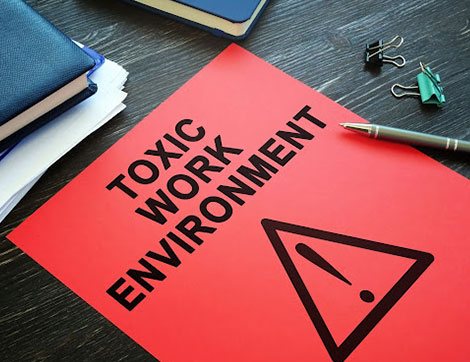It’s no secret that working in a toxic work environment can have serious consequences for your health. From anxiety and depression to physical health problems, the effects of a toxic workplace can be far-reaching and devastating.
When talking about a “toxic work environment”, what comes to mind for most people are things like office politics, backstabbing colleagues, and maybe even a tyrannical boss.
If you’re currently working in a toxic environment, it’s important to take steps to protect your health. Here are some critical health issues to be aware of:
Stress, anxiety and depression
Working in a toxic environment can cause or exacerbate anxiety and depression. If you’re already struggling with mental health issues, a toxic workplace can make them worse. Symptoms of anxiety and depression include:
- Feeling overwhelmed or hopeless
- Loss of interest in activities you used to enjoy
- Difficulty concentrating or making decisions
- Changes in sleep patterns
- Increased use of alcohol or drugs
Cardiovascular disease. Exposure to workplace stress has been linked with an increased risk of cardiovascular disease. This includes conditions such as heart attacks, strokes, and high blood pressure.
Respiratory problems. Stress can also lead to or worsen respiratory problems such as asthma or bronchitis.
Gastrointestinal issues. Stress can cause or contribute to gastrointestinal problems such as ulcers, irritable bowel syndrome (IBS), and acid reflux.
Skin problems. Stress can also cause skin problems such as acne, psoriasis, and eczema. One study found that people who experience high levels of job stress are more likely to have skin problems than those with low levels of stress.
Headaches and migraines. Stress can trigger headaches and migraines in some people.
Immunity problems. Prolonged exposure to stress can weaken your immune system, making you more susceptible to illness and infection. Stress can weaken your immune system, making you more susceptible to illness. One study found that people who experience high levels of job stress are more likely to get colds and other upper respiratory infections.
Sleep problems: A toxic work environment can make it difficult to get a good night’s sleep. One study found that people who had high levels of job stress were more likely to experience insomnia and other sleep problems.
Memory problems: Stress can lead to memory problems and difficulty concentrating. One study found that people who experience high levels of job stress are more likely to have trouble with short-term memory and executive functioning (the ability to plan and organise).
Weight gain: Stress can lead to weight gain by triggering the release of cortisol, a hormone that leads to increased appetite and cravings for high-calorie foods.
Career damage: A toxic work environment can damage your career in many ways. For example, you may be passed over for promotions or not receive the recognition you deserve. You may also find it difficult to build positive relationships with colleagues. This can all lead to job dissatisfaction and eventually, job loss.
Relationship problems: The stress of a toxic work environment can spill over into your personal life, causing problems in your relationships. You may find yourself withdrawn and irritable with loved ones. You may also have difficulty sleeping, which can lead to arguments and further strain on your relationships.
Toxic work environments can have serious consequences for your health. If you’re struggling to cope, it’s important to seek help. Talk to your doctor about the effects of stress on your health and develop a plan to manage the stress of your job. You may also want to consider talking to a therapist or counsellor who can help you deal with the emotional toll of a toxic workplace.











